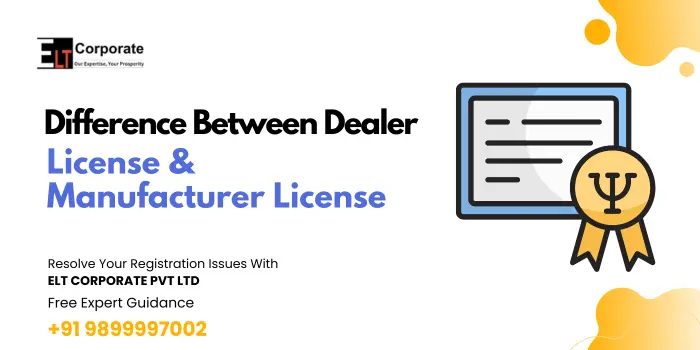You should obtain an industrial license if you are planning a business for sensitive or strategic items like tobacco, harmful chemicals, and risky pharmaceuticals. An industrial license is required for specific business types to guarantee that they meet safety and environmental standards. Now through this article, you will know the procedure to get the industrial license registration easily, and all the needed documents for the same.
What Is an Industrial License?
An industrial licence is the permit from the government that enables entities to work in specific industries. It is permitted to regulate and monitor activities that could influence the government, health of the public, and safety.
Which Industries Required Industrial License?
Below you will find a list of industries for which industrial licenses are mandatory to obtain before manufacturing:
- Distillation and Brewing of Alcoholic Drinks
- Electronics and Aerospace and Defence Equipment
- Cigars, Cigarettes of tobacco and manufactured tobacco substitutes
- Industrial explosives including detonating fuses, safety fuses, gunpowder
Hazardous chemicals including products hazardous to human safety and health
- Hydrocyanic acid and its derivatives
- Phosgenes and its derivatives
- Isocyanates and diisocyanates of hydrocarbon not elsewhere specified (for example methyl Isocyanate
Geographical Constraints for Industries To Obtain Industrial License
Enterprises located in the 25-kilometre area of the cities with at least residents of one million people should get an industrial certificate through the SPIRIT by IDEA legislation.
These compelling scenarios are free from the locational restrictions:-
- Non-Polluting Industries
- Prior to July 25, 1991, Enterprises that are situated in a location called “industrial area”.
To follow environment control, industrial units are subordinated to complete local zoning, land consumption limitation, and environmental rules.
Procedure for Submitting an Application for Industrial License
Here we have listed the procedure for the easy application procedure of an industrial license Prepare Documents – Gather all the papers that are needed for the registration of registration, although it is a bit complex process you can contact regulatory consultancy and get assistance:-
an industrial license, like company registration, address, product description, and all the important permits.
- Register on the PIIT Portal – Visit the Department of Promotion of Industry and Internal Trade (DPIIT) website and make an account on the website.
- Completion of Form – Fill in the required details on the online form with the necessary information related to your company and entity.
- Submit the Application – Upload all the papers and provide your application.
- Wait for the Review – SPOT will check your application. They can also ask for more details or approval/rejection of your application.
List Of Documents Required for Industrial License
You need these documents for industrial license registration, however, in some cases, you require more documents, for details one can contact a regulatory consultancy provider:
- Least deed of the constitution
- Memorandum article
- Board Resolution Certificate
- Key Plan/Site Plan
- Certificate of Safety of explosives
- Copy of electricity bill
- License for Incorporation
- Directors list
- Id proof of occupier and manager
- NOC of fire
- NOC of UPPCB
- List of raw materials
- Foreign Direct Investment (FDI)
- Notice of chief inspector
- Information regarding legal actions against the entity/director (If needed)
- Process flow diagram
What Is The Validity of Industrial License?
An industrial license is usually valid for 5 years. If you require an extension, you can apply for an industrial license before the expiration date.
What Are The Benefits Of Industrial License?
There are many benefits of industrial license as it assists entities to comply with standards, access government incentives, and boost credibility. All the benefits are mentioned below:-
Compliance
- Legal Protection
- Safety
- Regulatory Compliance
Incentives
- Government Schemes
- Tax Benefits
- Credit Facilities
Credibility
- Trust
- Confidence
Regulation
- Monitoring
What Is The Exemption Of Industrial License?
There are many undertakings in India for most of the industries but they are exempt from requiring an industrial licence to manufacture. However there are few exemptions.
- Companies reserved for the public sector
- Item of manufacture reserved for the small scale sector
- Proposal which attracts locational restrictions.
Compulsory Licensing
There are many enterprises that are subjected to mandatory licensing:-
- Tobacco Items
- military aviation
- Dangerous Chemicals
- Distillation and Brewing of alcoholic drinks
- Cigars and Cigarettes of tobacco and Manufactured Tobacco
- Electronics
Who Issues Licenses To Industries In India?
The Secretarial Industrial Assistance “SIA” permits the industrial license into India.
What Is The Industrial Licensing Policy?
The industrial licensing policy is a governmental regulation that requires entities to get a certificate prior to starting or expanding manufacturing in specific industries, importantly acting as a controlling mechanism to handle the development and location of industries within a country.
Important aspects of industrial licensing policy:-
Purpose – To manage and boost the industries by choosing which industry can be set up, where they can be located, and above all what production capacity they can have.
Permit Authority – The government bodies responsible for granting certificates, normally a department under the ministry of commerce or industry.
Essential points to keep in mind while applying for licence approval:-
- Industry type
- Location
- Production Capacity
- Technology utilized
Locational Restrictions for Industries
In this provision of the IDRA act, industries located within 25 kilometres of the cities with a population of 1 million or more should follow these particular regulations.
- Polluting Industries – Enterprises that produce pollution in the environment will have to meet the rules set by the higher respected authorities.
- Non-Polluting Industries – These industries, such as IT and firms, can’t face these kinds of restrictions.
De-Licensed Industries in India
There are some de-licensed industries in India, for instance:-
- Manufacturing sectors – Food processing, special electronics, textiles, etc.
- Certain Service Industries – IT services, don’t need a mandatory license any longer.
These enterprises are de-licensed to support growth and make business easy.
Industrial License – In the Influence of Arms Act 1959
The arms act of 1959 deals with industries related to arms, ammunition, and explosives. These enterprises should get a certain industrial license because of the sensitive and potentially dangerous side-effects of their products. These devices are handled through DPIIT’s authority of licensing beneath the arms act 1959, here we have listed the types of device:-
- Spacecraft, Defence aircraft, and device parts
- Armored fighting vehicles, for instance tanks
- Every kind of warships
Conclusion
In conclusion, industrial license registration in India is an important and straightforward procedure, although it needs careful focus on industry’s potential impact on health, safety, and the environment. Some enterprises are mandatorily licensed because of the risk they impose, whereas others are de-licensed for commercial simplicity. It is required to check the regulations of DPIIT on a regular basis to confirm the important procedure of compliance.
Do all Industries Need a License?
No, there are only some certain kinds of industries that require industrial license, i.e dangerous or polluting, require a mandatory license.
How Long is an Industrial License Valid For?
The industrial license is valid for almost 5 years, moreover you can apply for the extension.
Where Should I Apply for the Industrial License?
You should apply through DPIIT portal online.




